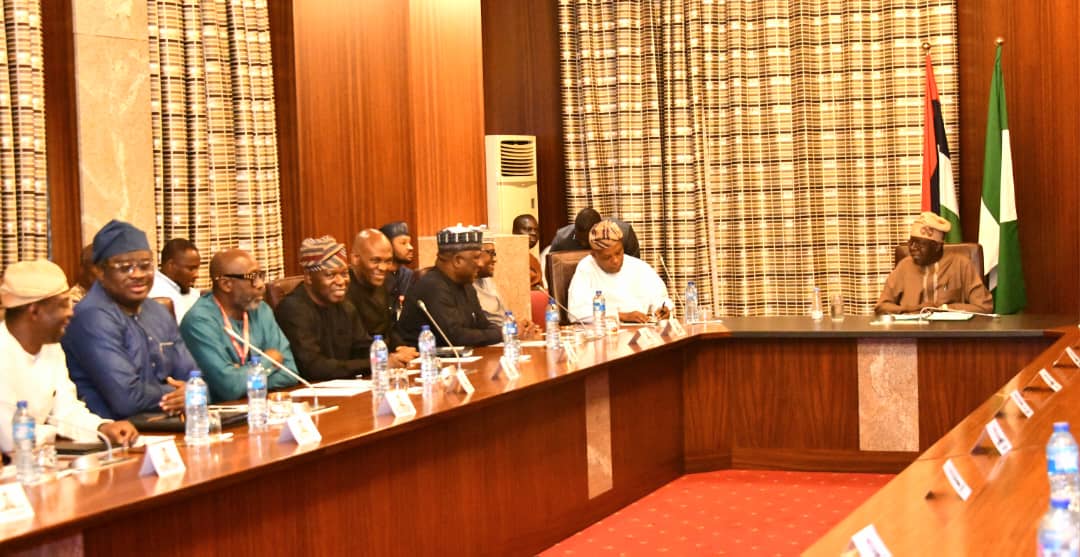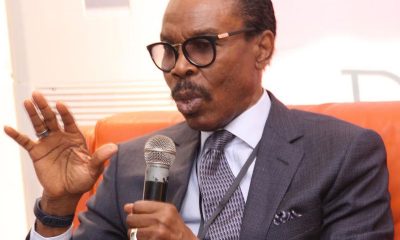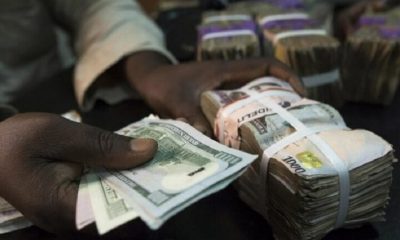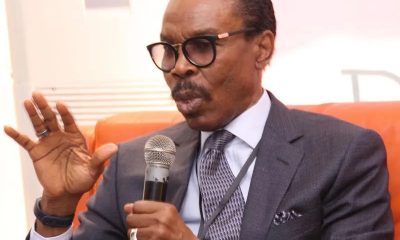Economy
Rewane Explains Implications of CBN Naira 4 Dollar Scheme

By Adedapo Adesanya
Last week, the Central Bank of Nigeria (CBN) shocked Nigerians when it launched a new initiative tagged Naira 4 Dollar Scheme.
The scheme was part of efforts to incentivize senders and recipients of international money transfer. Under the campaign, all recipients of diaspora remittances through licensed International Money Transfer Operators (IMTOs) will be paid N5 for every $1 received as remittance inflows.
This has sent many Nigerians wondering what the new policy meant for the Nigerian currency, which has faced headwinds in the last few months.
Speaking on the likely implications of the currency promo, a renowned economist and the Chief Executive Officer of Financial Derivatives Company, Mr Bismarck Rewane, during a chat with Business Morning on Channels TV on Monday, explained that the initiative from the CBN was a promo designed to increase the country’s awareness and the inflows of Nigeria’s diaspora into the country’s financial system.
He, however, noted that it was rare for the government to use such promotional schemes to promote inflows into the country.
“What is challenging here is that it is very unusual for policies to be tied around promos or gimmicks. Usually, promos and gimmicks are used by manufacturers to launch or push products, or airlines when they have low sales. So, they tie this kind of promo to buy one get one free or to revamp stagnant sales. So, it’s very unusual and peculiar for governments to engage in gimmicks or promos,” he noted.
He further said that the apex bank tailored the actions towards reducing the cost of remittances from the current cutthroat rates charged by the IMTOs.
The Governor of the central bank, Mr Godwin Emefiele, had recently explained that the models had been applied in Pakistan and Bangladesh. He said both South Asian countries had introduced reimbursement schemes to support inflows.
In the CBN chief’s words, “In Pakistan, the scheme, which is known as free send, has enabled record amount of inflows of over $2 billion a month even during the COVID-19 pandemic.
“Bangladesh introduced its own scheme in June 2019, which is a two per cent rebate on remittance inflows. Following this action, they have also seen a 20 per cent boost in remittance inflows.”
Breaking it down further, Mr Rewane noted that the current diaspora inflows to Nigeria are estimated between $5 million and $7 million per day and that the central bank aims to increase to $30 million per day.
“In other words, 30 times 20 working days, you will get maybe $600 million. Well, that is not the point. The point is that it is an effective depreciation of 1 per cent of the currency because ever since this year, the Investors and Exporters’ (I&E) window rate had gone from N390 to N411. So, if you add N5, it is another 1 per cent.
“Nominally, the exchange rate is unchanged, but in reality, it is a depreciation of 1 per cent de facto.”
He noted that there a lot of risks associated with the policy because some people will round trip the policy using arbitrage. Arbitrage is the simultaneous purchase and sale of the same asset in different markets in order to profit from tiny differences in the asset’s listed price.
“So, people will try to use arbitrage on the system. But the fact is that Nigeria is number six in the world in terms of diaspora and workers remittances. It is estimated at about $20 to $25 billion [annually].
“The current pandemic and unemployment rates in the US, Canada, the European Union and the United Kingdom are also going to affect the ability of Nigeria to remit money in.
“These two trends have actually dropped sharply because of vaccination certificates and all sorts of the pandemic effect. So, basically, in the end, I think it’s a gimmick. It is a promo, the central bank will fully understand in the end that there’s no other way of managing an exchange rate than converging them, having one rate so that people don’t stop exploiting it.
“In any case, you collect cash, and you take it to the parallel market or autonomous sources to sell the Naira, and then come back and you get the N5. What could happen is that you could turn $1,000 back again to your brother, who will bring it back.
“So, what could happen is that there could be what I call playing with neurons, the same money turning around the velocity of separation increasing, whilst the quantity supplied into the market will not increase.
“So, but again, heavy innovation leads to some kind of creativity and will help. But in the end, let me put it this way, the price mechanism, the exchange rate has to be market-determined.
“Policymakers will intervene, to preserve to ensure that we don’t suffer from shocks, but it’s a work in progress, and then we’ll wait and see what happens.”
The promo is expected to run from March 8 through the next two month till May 8.
Economy
Grey to Cut Cross-Border Payment Costs with New USD Offering

By Adedapo Adesanya
A cross-border payments solutions company, Grey has expanded its business banking platform to include US Dollar corporate accounts, bulk international payments, and USDC stablecoin support, all integrated into a single system.
The company is positioning itself as a low-cost, faster alternative to traditional international banking, particularly for businesses in emerging markets as it enables companies to open US Dollar accounts, receive global payments, and send payouts to 170+ countries, including bulk transfers, within minutes.
Grey aims to solve common cross-border payment challenges, particularly the high transfer costs that often range between 6 and 7 per cent of transaction value, prolonged settlement cycles that can stretch across several days, and the limited access many businesses face when trying to open and operate foreign currency accounts. In addition, companies frequently contend with hidden intermediary fees and poor foreign exchange transparency, both of which undermine cost predictability and effective cash flow management.
By integrating USD business accounts and USDC stablecoin functionality into its platform, Grey enhances its value proposition around faster settlement, clearer pricing structures, improved cost efficiency, and broader global accessibility. The expanded capabilities enable businesses to manage international transactions with greater speed, transparency, and operational control.
“Businesses may operate without borders today, but access to reliable global banking remains uneven, particularly for companies in high-growth markets,” said Mr Idorenyin Obong, Co-founder and Chief Executive Officer of Grey. “We’re closing that gap and enabling businesses to move money faster, with greater transparency and control, wherever their clients or partners are based.”
“When payments are delayed, or costs are unpredictable, growth stalls,” added Mr Joseph Femi Aghedo, Chief Operating Officer and Co-founder of Grey. “Grey eliminates those friction points, giving businesses a faster, simpler way to manage payroll, supplier payments, and partner payouts across borders. Adding USD and stablecoin capabilities makes these benefits accessible to even more customers.”
Established in Africa in 2020, Grey has a presence in key markets, including the United States, the United Kingdom, and Europe, and has recently expanded its services and operations into Latin America and Southeast Asia.
Since its inception, the company has consistently enhanced its services to empower digital nomads worldwide, regardless of location. Grey’s offerings include multi-currency accounts, low-cost international money transfers, a virtual USD card, expense management tools, and robust security measures.
Economy
Quidax, Lisk to Unlock Stablecoins, On-chain Financial Opportunities

By Aduragbemi Omiyale
A partnership designed to expand access to stablecoins and on-chain financial opportunities for everyday users and businesses has been entered into between Quidax and Lisk.
The partnership provides a critical gateway for the developer community, as builders on the Lisk network can now leverage Quidax’s robust digital asset infrastructure to access stablecoins and local currencies at competitive rates.
This institutional-grade infrastructure is designed to power “future-forward” financial products, ranging from neobanks and cross-border payment platforms to regional exchanges and global fintech solutions. It will also allow Quidax customers to trade and move value seamlessly using USDT, USDC, LSK, and Ether (ETH) on the Lisk network.
The collaboration will also accelerate the adoption of Web3 solutions that solve real-world financial challenges for millions of customers across Africa by combining Quidax’s deep local liquidity and compliant framework with Lisk’s scalable L2 technology.
In 2024, Quidax became the first crypto exchange to receive a provisional operating license from Nigeria’s Securities and Exchange Commission (SEC).
“The partnership with Lisk enables us to extend our platform to serve more people and cater to the increasing demand from products and services that want to integrate our stablecoin and digital assets product to build products across Africa,” the Chief Infrastructure Officer at Quidax, Mr Morris Ebieroma, said.
Also commenting, the Ecosystem Lead for Africa at Lisk, Ms Chidubem Emelumadu, said, “Africa represents one of the most critical frontiers for blockchain innovation, where the demand for reliable and inclusive financial tools is urgent.
“Our partnership with Quidax expands access to stablecoins and on-chain financial opportunities for everyday users and businesses. At the same time, it gives founders building on Lisk the critical infrastructure they need to create solutions that can scale meaningfully across the continent,” she added.
Economy
Customs Urges Freight Forwarders to Adopt Automated Licence, Permit System

By Adedapo Adesanya
The Nigeria Customs Service (NCS) has urged freight forwarders to adopt its automated Licence and Permits Processing system to reduce the cost of doing business.
This advice was given by the Assistant Comptroller-General of Customs, Mr Muhammed Babadede, during a stakeholders’ engagement on automation held in Lagos on Monday.
He noted that the reform responds to longstanding demands for faster, more transparent and simpler procedures for industry stakeholders, disclosing that Comptroller-General of Customs, Mr Bashir Adeniyi, has approved the full automation of the service’s licences and permits processes.
“For years, stakeholders dealt with paperwork, long queues and uncertainty from manual processing. Those days are coming to an end.
“This sensitisation is across all zones. The goal is to ensure stakeholders understand the automated system before implementation,” Mr Babadede said.
He said automation would enable applications and renewals from offices or mobile phones, eliminating visits to customs formations, assuring stakeholders of a fair and consistent process, and reducing errors associated with manual documentation.
He said automation would improve record-keeping, supervision and service delivery without increasing pressure on officers.
The Deputy Comptroller-General, Tariff and Trade, CK Naigwan, also represented by Mr Babadede, reiterated management’s commitment to seamless implementation.
Meanwhile, the Comptroller of Customs for Licence and Permit Unit, Mrs Ngozika Anozie, praised the Comptroller-General for driving innovation within the Service, saying the automation aligns Customs procedures with global best practice and strengthens institutional efficiency.
According to her, the reform reflects the three-point agenda of the Chairman of the World Customs Organisation, Mr Adeniyi, centred on consolidation, collaboration and innovation.
She said the system would enhance the ease of doing business in the maritime sector and boost national revenue generation.
“Automation will cut business costs and reduce travel risks for stakeholders
“They will no longer travel repeatedly to Abuja, paying for transport, hotels and feeding to process licences and permits,” she said, adding that the platform would automatically reject fake documents and accept genuine submissions, curbing fraudulent practices.
“The CGC is determined to sanitise the system, and we are committed to achieving that objective,” Mrs Anozie said.
On his part, the Assistant Superintendent of Customs, Mr Ibrahim Usman, said the Licence and Permit Unit operates under the Tariff and Trade Department.
He explained that the unit ensures proper issuance of licences and permits and compliance with import regulations.
Mr Usman said all licences and permits expire on December 31 of their issuance year.
He added that the portal would become fully operational after nationwide sensitisation, with stakeholders duly informed.
Customs Area Controller, Tincan Island Command, Mr Frank Onyeka, thanked stakeholders for their continued support.
He urged them to take the exercise seriously to achieve seamless processing across Customs operations.
Stakeholders raised concerns about online payment integration and potential technical disruptions.
Officials addressed the questions and pledged continued engagement to ensure smooth implementation nationwide.
-

 Feature/OPED6 years ago
Feature/OPED6 years agoDavos was Different this year
-
Travel/Tourism10 years ago
Lagos Seals Western Lodge Hotel In Ikorodu
-

 Showbiz3 years ago
Showbiz3 years agoEstranged Lover Releases Videos of Empress Njamah Bathing
-

 Banking8 years ago
Banking8 years agoSort Codes of GTBank Branches in Nigeria
-

 Economy3 years ago
Economy3 years agoSubsidy Removal: CNG at N130 Per Litre Cheaper Than Petrol—IPMAN
-

 Banking3 years ago
Banking3 years agoSort Codes of UBA Branches in Nigeria
-

 Banking3 years ago
Banking3 years agoFirst Bank Announces Planned Downtime
-

 Sports3 years ago
Sports3 years agoHighest Paid Nigerian Footballer – How Much Do Nigerian Footballers Earn






















